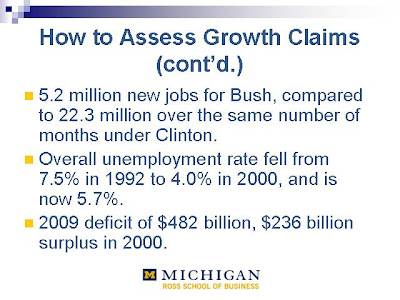For true tax policy geeks, here's the video from the forum last week in Minnesota with Obama economic adviser Austan Goolsbee, McCain adviser John Taylor, and tax policy experts Len Burman and Joel Slemrod. The forum was ably moderated by Howard Gleckman . (To see the video, you have to click "High Speed" and then choose "Panel C")
This was the best discussion of the candidate's tax proposals I've witnessed. In part this was because Taylor was standing in for Doug Holtz-Eakin, McCain's former economic adviser, who has been dispatched to help Susan Palin cram on domestic policy talking points. Taylor is clearly not well-versed in the candidates' proposals or the analysis of the Tax Policy Center, but this actually made for a better, more big-picture discussion.
The speakers generally agreed on the fundamental difference between McCain and Obama on tax policy: McCain wants to double down on the Bush policy of tax cuts for corporations and the top 2% of high earners, while Obama wants to largely return to Clinton-era policies and reduce taxes for the middle class. As Goolsbee said, McCain's tax cuts would be twice as regressive as Bush's, and the deficits would be twice as large. Taylor didn't argue the point.
In Joel Slemrod's presentation, he asked how a non-economist could evaluate the potential effects of the candidates' proposals on the economy. (By the way, Joel's book Taxing Ourselves, A Citizen's Guide to the Debate over Taxes is by far the best popular guide to the topic.) He said that an imperfect but plausible approach is just to compare the records of the Clinton and Bush presidencies.
Here are two slides from Joel's talk:
Joel didn't draw any explicit conclusions from this comparison, but the facts speak for themselves. By every measure, the economy has performed far worse under Bush than Clinton. This is echoes the comparison highlighted in Alan Blinder's recent column: incomes consistently rise more under Democratic presidents than under Republicans.
Joel acknowledged that of course many other things have changed during the Bush years other than tax policy, in particular the international environment. But, he noted, the decline in economic performance has been more severe in the United States than in all other major developed countries. This suggests that U.S.-specific factors--and maybe even tax policy--have been responsible for the deterioration of economic performance in the Bush years.
Saturday, September 6, 2008
Report from the RNC Tax Policy Forum with Austan Goolsbee and John Taylor
Posted by
Don Pedro
at
7:55 AM
![]()
![]()
Subscribe to:
Post Comments (Atom)





2 comments:
Um, did you think to account for natural cycles that take place within an economy. There's no reason to expect that an economy will always grow at the same rate or even grow at all and there are many factors that influence this. One such factor is the explosion of a revolutionary technology (e.g. computers and the internet). Do you really think it mattered during the 90s who the President was? We still would have had the tech boom.
The reason Joel didn't make any conclusions is because it's apparent to most people who understand the nature of an economy that sometimes you just happen to be in the right place at the right time to take advantage of or take credit for things that are completely out of your control. The tech boom was one of those. I'm sorry, but this isn't too difficult to understand.
"Do you really think it mattered during the 90s who the President was?"
Short answer: yes.
The Blinder article gives the more systematic analysis. For post WWII presidents, economic growth has been way higher under Democratic presidents than Republican presidents.
Unless you want to argue that Democrats are just naturally lucky, this is strong evidence that there was something different and better about the Democratic presidents' policies.
Hey, even if do want to argue that Democratic presidents are just lucky, I'll accept that as a reason to vote for Obama!
Post a Comment